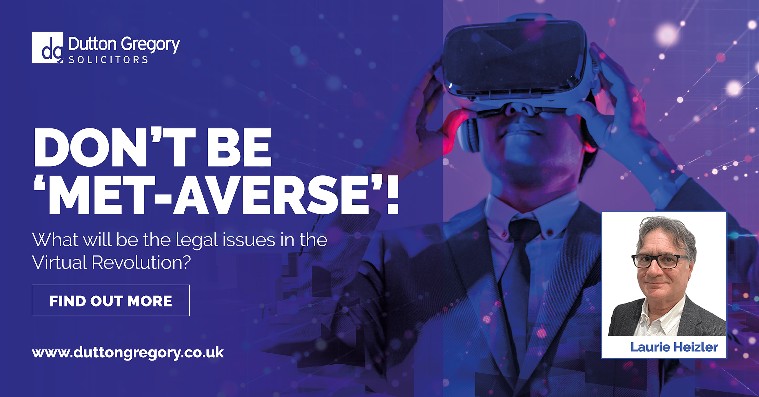The ‘metaverse’ will be big for everyone. The increasingly sophistication of virtual applications is the future of the internet, with individual metaverse platforms such as ‘Decentraland’ and ‘Roblox’ growing in recognition and popularity, and lawyers certainly won’t be ‘met-averse’ given its profound legal challenges. In this article, Laurie Heizler examines what some of these might be.
What is the metaverse?
Each metaverse consists of connectable networks of apps and platforms that each host virtual reality worlds. In these worlds, digital representations of people, consumer goods, artworks and real property may be viewed. At the present time there are a variety of individual metaverses but they may one day be able to communicate with each other and form a single, holistic virtual reality.
What will the metaverse do?
Metaverse users will be exposed to a shared, immersive digital environment permitting interactions with people and objects digitally imposed on real world properties, such as retail goods and physical buildings. Individuals may choose to create digital versions of themselves (or who they would like to be) called ‘avatars’ to populate the metaverse, connect with other people and commercial entities selling games, cars and luxury fashion brands.
The metaverse will create new markets for goods and services, provide creative, entertainment and learning spaces, and bring fresh sources of fun through virtual-reality headsets. Commercially, metaverse techniques are already proving to be of benefit to the fashion industry as virtual clothing lines can be developed without wasting physical material on prototypes. In the medical field, Johnson & Johnson has created a metaverse of its own to train surgeons by provision of virtual learning simulators for various surgical procedures.
The legal issues
As a new transformative technology, the metaverse will open up new legal frontiers, but there are foreseeable intellectual property (IP), data privacy, regulatory, employment and jurisdictional problems.
Taking a few guesses from the application of “real world” law to entirely digital environments, here are the specifics of just a few issues that might arise:
- Location. Given that the metaverse is only “out there” in cyberspace, difficulties may arise with the application of the law of any particular country. There may be problems in identifying the actual physical location of any real person or the place where there has been some breach of law. Jurisdictional disputes could be avoided if one day the internet itself became its own jurisdiction.
- Intellectual Property (IP). It may not be certain where IP rights such as copyright and trade marks are protected. In order to extend brand presence safely to the metaverse, there will be a need to ensure that there are new and purely digital categories of goods and services in which trade marks may be specifically registered. Perhaps the time has come when the digital world needs to become a wholly independent “territory” in which IP rights can exist regardless of real world use?
- Enforcement. If there are IP infringements, will new bodies need to be set up to implement “take down” procedures or grant restraining orders on infringements taking place on interconnected Metaverse platforms?
- Licences and assignments of IP and other contracts will need to take account of rights to be granted or obligations to be discharged in the Metaverse.
- Ownership There will be title disputes relating to digital property in artworks and real estate. Virtual ownership questions will hopefully be mitigated by proof of payment using Non-Fungible Tokens (NFTs) that establish value through encrypted transactions in blockchain. In effect,NFTs are digital money and blockchain enables valid proof of purchase of metaverse content and therefore unique ownership.
- Security There will be challenges to the protection of privacy and cyber risks generally. It will be interesting to see the extent to which the Data Reform Bill (proposing to change GDPR-based law) will take account of issues arising in the metaverse.
- Employment Where the metaverse becomes a workplace, discriminatory conduct, harassment and other toxic behaviours may be manifested by avatars at a remove from the fellow employees who may be ultimately responsible. There will be undoubted factual differences between the actual and the virtual situation which the law will need to address.
Conclusion
The metaverse is with us now. It will grow in sophistication giving rise to a whole new range of novel issues. Some of these may be resolved under existing law. But the far-reaching nature of the metaverse and its qualitative differences may however make new legislation inevitable.







